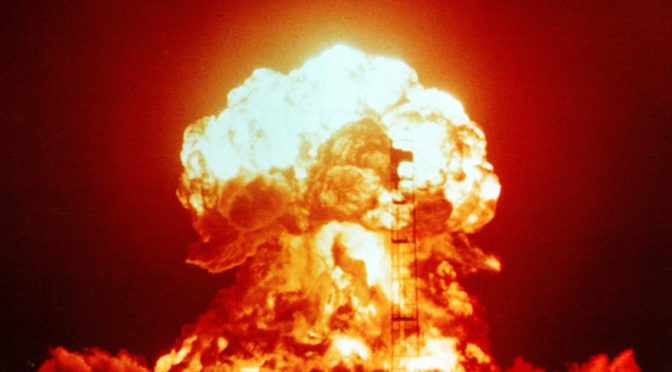Not since the days that Ronald Reagan was in office have I paid as much attention to the potential of nuclear war as I do now.
In the ’80s, the thermostat on the Cold War was set at below zero and headlines were filled with talk of a “Star Wars” missile defense project and a railroad-based ICBM launch system.
It was also a time of heightened activism supporting nuclear disarmament and the television movie “The Day After” depicting the horrors of nuclear war.
But it all felt unreal and remote to me then.
Not now.
Consider the headlines about North Korea and its numerous test-fired missiles, which now appear to be within reach of Chicago and other major U.S. cities.
The Doomsday Clock is set at two and a half minutes to midnight, the closest the world has been to calamity since 1953.
All of this has given rise to a growing interest in ways to survive a nuclear war, to which I can only ask: Are you serious or delirious?
The idea of surviving a nuclear holocaust – or more accurately, the desire to want to survive one – is pure folly.
Think about it: You would live in a confined space, eat canned rations and be unsure when it would be safe to surface.
That is certainly not living. It’s barely surviving. And for what?
So you can face victims of radiation poisoning and burns, the catastrophic loss of life, the destruction of cities and an end to civilization as we know it?
It’s not an unfounded worry. There’s plenty of firepower to blow us all to kingdom come: Nine countries collectively have 14,900 nuclear weapons, the vast majority in the hands of the United States and Russia, according to Ploughshares Fund, a nonprofit dedicated to reducing nuclear threats.
According to the website NukeMap, if the “Tsar Bomba,” the largest Russian bomb tested, was dropped on New York City, it could kill 7.6 million people and injure 4.2 million. The fallout could affect millions more.
Not to be too cavalier and macabre about it, but I’d rather be right at ground zero and annihilated in the first seconds of a blast than be among those left to try to pick up the pieces.
The thinking about surviving a nuclear blast dates back to right after World War II. A website called Old Pics Archive has a collection of photos of bomb shelters from yesteryear, including one with a happy couple on their honeymoon!
I’m reading a fascinating book called “Raven Rock: The Story Of The U.S. Government’sSecret Plan To Save Itself — While The Rest Of Us Die.”
It examines the elaborate plans to ensure the continuity of government in the event of nuclear war.
The plans include numerous secret bunkers to house the president and other leaders and, among other things, a stash of $2 billion in cash, much of it in $2 bills, because, well, you know, I guess money will still have value after the landscape is vaporized.
More recently, CNN reports that Rising S Company, which makes doomsday bunkers, said 2016 sales for its custom-made underground bunkers increased 700 percent from 2015, and overall sales increased 300 percent since the presidential election in November.
Those investing in these doomsday bunkers have more hope about life after death (and destruction) than I do.
Related:

